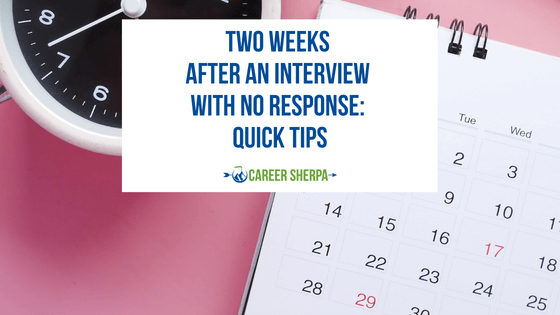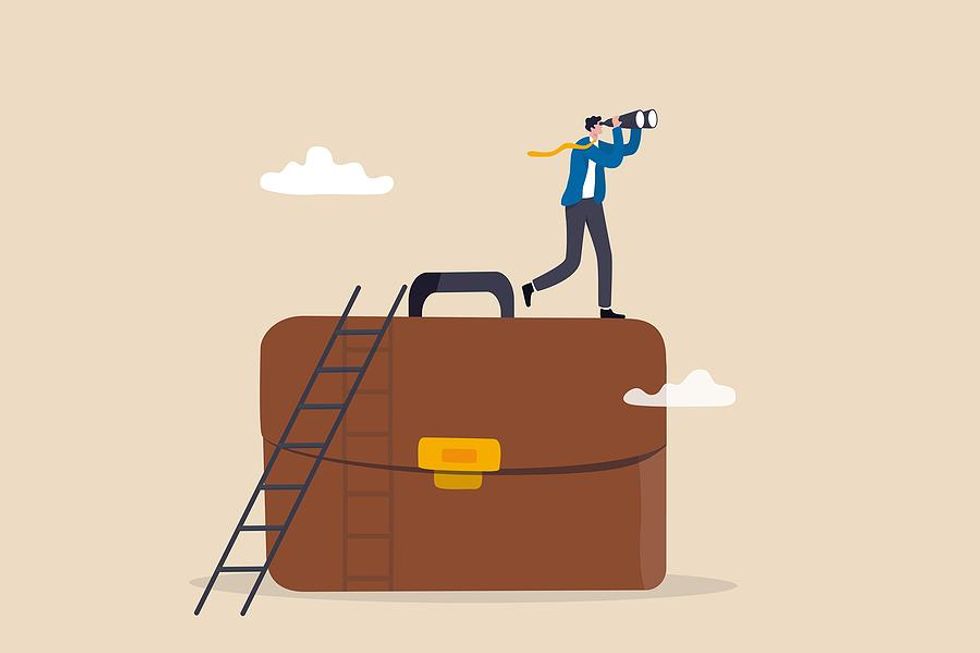If it has been two weeks after an interview with no response, it''s only natural to wonder what that means for you. Are you officially out of the running? Has the hiring process been delayed? Should you follow up?

This guide will help you understand why this happens, and what you should do next.
Potential Reasons Why You Haven’t Heard Back
Waiting for a response after an interview can have you on the edge of your seat, and the longer time goes on, the more worried you might get. Hiring processes are complex, and there are many possible reasons why you have yet to receive that coveted call.
Here are a few common potential reasons why it''s been two weeks after an interview with no response.
1. Someone Else Was Chosen, and You Weren’t Notified
If it''s been two weeks after your interview and you haven''t heard back, it could mean they chose someone else and the job is no longer up for grabs. This reason might be the worst-case scenario playing in your head, and it’s a reality that many job-seekers face. When there’s only one position to fill and stiff competition trying to land it, the odds aren’t always in your favor.
Generally, it''s considered courteous for the hiring manager to inform you that you didn’t get the job. But while that''s standard practice, it’s not a legal requirement. Sometimes, things slip through the cracks, and companies forget to notify the applicants that didn’t make the cut.
2. You’re in a Competitive Group of Applicants
In some cases, hiring managers have no choice but to spend more time than they initially planned to make a decision. This scenario often plays out when the pool of applicants is exceptionally strong or the position is higher up in the company. You may be among a group of highly qualified professionals vying for the same job.
Every company wants to receive applicants from high-performing candidates. But when they do, it’s not always easy to settle on one new hire. For many positions, moving forward with the next candidate is a big deal and can substantially impact an organization’s bottom line.
That means they don’t rush the decision, taking longer than usual to settle on just one person. In this case, that''s likely a good sign for you. It could mean that you’re still in the running, and the decision-makers are weighing their options and not taking this decision lightly.
So while it might be two weeks after the interview with no response, there''s still the chance you might hear back as they narrow things down further in the coming weeks.
3. The Decision-Maker is Unavailable
Here’s a reason that comes down to a case of bad timing! Hiring teams can go through the entire interview process, but they''re unable to move forward if the key decision-maker isn''t available.
Final hiring decisions can fall onto one of many people. It might be down to a hiring manager, a human resources head, or even a C-suite executive. Whatever the case, they must be present to look through the highest-qualifying candidates and make a decision.
But when they’re out of the office, that’s not possible. Perhaps the decision-maker went on a vacation during the interview stage and hasn’t returned yet. Or maybe they experienced a sudden emergency and have been out of the office for several weeks.
Whatever the case, the unfortunate timing freezes the entire hiring process. If this is the case and it''s been two weeks without hearing back about an official decision, don''t worry too much. There’s a good chance that the hiring team has everything lined up and ready to go to make that all-important decision once they return.
4. They’re Waiting for the Budget to Make a Hire
Bringing new employees into a company is a significant investment. In some cases, organizations advertise new positions before they receive funding and approval to start the onboarding process. It’s a way to get ahead of the curve and hit the ground running once that budget comes through.
But as you would expect, corporate budgeting takes time and involves many departments. Finalizing the budget may take longer than the hiring manager initially expected, delaying the decision-making. The company might already have a candidate chosen, but they can’t inform them until the budget is there to continue the hiring process.
If this is the reason for the lack of communication, keep an eye out for emails and phone calls. It’s common for hiring managers to reach out after two weeks to ensure that you’re still interested as they wait for that budget approval.
5. The Process Simply Isn’t Over Yet
Many people have an incorrect assumption that hiring processes are quick and efficient. While some companies have strict schedules and run like well-oiled machines, that’s not always the case. Even if hiring managers usually make quick decisions, things can happen to slow everything down.
Hearing back after two weeks is the norm, but it’s not a rule that organizations have to follow. If it''s been two weeks after an interview with no response, the hiring team could still be working behind the scenes. They may still be conducting interviews or screening applicants.
It’s frustrating for both you and the company when delays bog down the process. You’re most likely to encounter this scenario if the company receives more applicants than they expected. The hiring team is doing what it can to give everyone a fair shot and ensure that the right person gets the job.
In some cases, delays can extend hiring processes by several months. You may or may not get an update about how things are going, so it’s wise to reach out for a follow-up yourself.
6. Filling the Position Isn’t Urgent
Finally, you might not hear back after two weeks because there’s no urgency to fill the position. This reason can be both disheartening and frustrating, but you have to remember that priorities shift and hiring managers may have to switch their focus to more pressing matters.
There''s a greater chance of it being considered 'low urgency' if the position doesn’t impact daily operations too much. That doesn’t mean that the role isn’t essential to the bigger picture, but hiring managers don’t have to rush to fill it. So, they will take their time, meaning you might go two weeks without a response.
Interestingly enough, the lengthier hiring process can sometimes benefit you. Generally, it means that teams will look at resumes and qualifications more closely without the stress of having to make quick decisions. This may give you a better chance of getting hired if you''re a competitive applicant.
What Should You Do?
Waiting to hear about a job can be a nail-biting experience. Don’t let yourself fall prey to a cycle of negativity and doubt. As you can see, there are many reasons why it might be two weeks after an interview with no response. And it doesn’t necessarily mean that you’re out of the running!
Instead of constantly worrying, here are a few things you can do as you wait.
Send a Follow-Up Email
If it''s been two weeks after an interview with no response, you should feel confident sending a follow-up email. The only exception is if you were told that it would take longer than two weeks to make a decision.
Send an email to the last person you had contact with and inquire about the process. Ask if there’s anything they need from you to help with the decision-making process. Sometimes, they’ll ask for more support documentation or additional information about your qualifications.
Be polite and reiterate your interest in this role. In many cases, receiving that follow-up message works in your favor. Companies want to hire applicants who show genuine interest in the position. Your email shows your interest and that could work in your favor!
Once you’ve followed up, take these additional steps.
Keep Busy and Stay Positive
The most important thing you can do is stay positive. Job searches aren’t easy and can last for months (depending on your experience and field). One thing you should never do is sink into feelings of self-doubt and negativity.
If it''s been two weeks after an interview with no response, it’s easy to get into that mindset. But when you do, you’ll have nothing but anxiety, stress, and possible depression to battle.
Do what you can to maintain a positive attitude!
Whether you get the job offer or not, other opportunities will come your way. Don’t get too attached to this one position.
Keep your chin up and find ways to keep yourself busy. Waiting breeds negative thoughts when it comes to something as important as a job offer. Stay focused on your job search activities each day to ensure you don’t get lost in a sea of what-ifs and worst-case scenarios.
Continue Your Job Search
The best tip anyone can give you about searching for a new job is to keep going. Some people end up applying for tons of jobs before getting that elusive offer. It takes a lot of work, and you may be waiting months.
Now, imagine what would happen if you halted your job search. What will you do as you wait? Even worse, what happens if the company passes and doesn’t offer you a job? Suddenly, you’ve wasted weeks hoping for a happy ending that didn’t pan out.
Maintain your momentum and keep that job search going. Continue looking for new positions and research as many companies as possible (here''s a list of the best job search websites to help you do this). New positions open up all the time, so check back with listing sites and see what’s available.
Who knows? You might come across an even better opportunity. You’ll never know if you stop looking while you wait.
Find Employees To Talk With
If you are truly interested in the job, talk to an employee who works at the company to find out what''s happening with the hiring process. You may already know an employee from before the interview process started. If you don''t know any employees, use LinkedIn to find someone who works in the same department you''ll be working in. Send an email explaining your situation and ask what they know or what they can find out about the hiring process.
Improve Your Skills
There’s no better time than now to expand your professional skill set. You obtain new skills while you work, but there’s no excuse to rest on your laurels during your job search. As you wait for a callback and continue sending in new applications, consider ways to improve yourself.
You can take classes at your local community college, turn to online courses for new certifications, and more. It doesn’t have to be complex or expensive. Everyone can benefit from learning soft skills to become better communicators or team players.
There’s also the opportunity to get familiar with new software relevant to your field. Whatever the case, those are all skills you can add to your resume. Companies love applicants who go above and beyond to improve themselves.
Why not take up classes to express your creativity? While not directly related to your field, art or fitness classes can help you stay physically and mentally fit.
No matter what you choose to do, finding ways to acquire more skills is a great way to spend your time and ensure that you remain productive while waiting for a response.
Revamp Your Resume
No matter how well-written your resume is, there’s always room for improvement.
Resumes are some of the most important documents you’ll use during your job search. Hiring managers utilize them to learn more about you and what you have to bring to the table. A captivating resume can make a significant difference during your job search.
Take time to read through your resume and find areas you can improve. Revamping even small sections can lead to better results. Reword awkward sentences, add new details as you improve your skills, and perform edits to make this document as perfect as possible.
Conclusion
As you can see, it''s beneficial to understand the potential reasons why two weeks have passed after an interview with no response.
Not only will this help you understand the process and stay positive, but it will give you some insight into what you should do next!
The post Two Weeks After An Interview With No Response: Quick Tips appeared first on Career Sherpa.

















